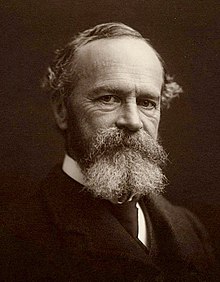
Back ويليام جيمس Arabic ويليام جيمس (فيلسوف) ARZ উইলিয়াম জেম্ছ AS William James AST Vilyam Ceyms AZ Уільям Джэймс BE Ўільям Джэймз BE-X-OLD Уилям Джеймс Bulgarian উইলিয়াম জেমস Bengali/Bangla William James Catalan
William James | |
|---|---|
 James in 1903 | |
| Born | January 11, 1842 New York City, U.S. |
| Died | August 26, 1910 (aged 68) Tamworth, New Hampshire, U.S. |
| Alma mater | Harvard University (MD) |
| Relatives | Henry James Sr. (father) Henry James (brother) Alice James (sister) |
| Era | 19th-/20th-century philosophy |
| Region | Western philosophy |
| School | |
| Institutions | Harvard University |
| Notable students | |
Main interests | |
Notable ideas | |
William James (January 11, 1842 – August 26, 1910) was an American philosopher and psychologist, and the first educator to offer a psychology course in the United States.[1] James is considered to be a leading thinker of the late 19th century, one of the most influential philosophers of the United States, and the "Father of American psychology."[2][3][4]
Along with Charles Sanders Peirce, James established the philosophical school known as pragmatism, and is also cited as one of the founders of functional psychology. A Review of General Psychology analysis, published in 2002, ranked James as the 14th most eminent psychologist of the 20th century.[5] A survey published in American Psychologist in 1991 ranked James's reputation in second place,[6] after Wilhelm Wundt, who is widely regarded as the founder of experimental psychology.[7][8] James also developed the philosophical perspective known as radical empiricism. James's work has influenced philosophers and academics such as Émile Durkheim, W. E. B. Du Bois, Edmund Husserl, Bertrand Russell, Ludwig Wittgenstein, Hilary Putnam, Richard Rorty, and Marilynne Robinson.[9]
Born into a wealthy family, James was the son of the Swedenborgian theologian Henry James Sr. and the brother of both the prominent novelist Henry James and the diarist Alice James. James trained as a physician and taught anatomy at Harvard, but never practiced medicine. Instead, he pursued his interests in psychology and then philosophy. He wrote widely on many topics, including epistemology, education, metaphysics, psychology, religion, and mysticism. Among his most influential books are The Principles of Psychology, a groundbreaking text in the field of psychology; Essays in Radical Empiricism, an important text in philosophy; and The Varieties of Religious Experience, an investigation of different forms of religious experience, including theories on mind-cure.[10]
- ^ T. L. Brink (2008). Psychology: A Student Friendly Approach. "Unit One: The Definition and History of Psychology". p. 10.
- ^ "William James: Writings 1878–1899". The Library of America. June 1, 1992. Retrieved September 21, 2013.
- ^ "William James: Writings 1902–1910". The Library of America. February 1, 1987. Retrieved September 21, 2013.
- ^ Dr. Megan E. Bradley. "William James". PSYography. Faculty.frostburg.edu. Archived from the original on November 24, 2014. Retrieved September 21, 2013.
- ^ Haggbloom, Steven J.; Warnick, Renee; Warnick, Jason E.; Jones, Vinessa K.; et al. (2002). "The 100 most eminent psychologists of the 20th century". Review of General Psychology. 6 (2): 139–152. doi:10.1037/1089-2680.6.2.139. S2CID 145668721.
- ^ J. H. Korn, R. Davis, S. F. Davis: "Historians' and chairpersons' judgements of eminence among psychologists". American Psychologist, 1991, Volume 46, pp. 789–792.
- ^ "Wilhelm Maximilian Wundt" in Stanford Encyclopedia of Philosophy.
- ^ Tom Butler-Bowdon: 50 Psychology Classics. Nicholas Brealey Publishing 2007. ISBN 1857884736. p. 2.
- ^ "William James". Stanford Encyclopedia of Philosophy. Center for the Study of Language and Information (CSLI), Stanford University. Retrieved September 21, 2013.
- ^ James, William (2009). The Varieties of Religious Experience. The Library of America. pp. 74–120. ISBN 978-1-59853-062-9.